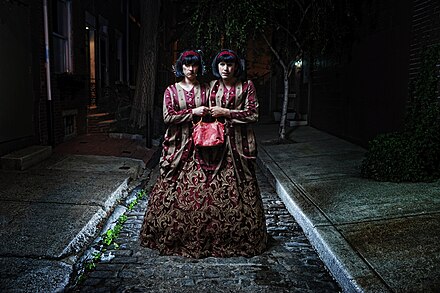
INTERVIEW | Performers Amanda Palmer & Jason Webley on Punk Cabaret, Africa, and Transcending Cultural Divides
June 2010 | Amanda Palmer, Jason Webley, and Sxip Shirey
Interviewed by Lachi, produced by Daniel J. Gerstle. Special Thanks to Yula Be’eri.
Humanitarianbazaar.org
There is a rapidly widening footpath between the worlds of punk music culture and youth in countries facing oppression, but it is little known outside theater groups, music venues, and exiles. Amanda Fucking Palmer, as she’s proudly known, and Jason Webley, two of the most influential songwriters and performers in today’s punk scene represent perhaps the most creative runners on that footpath.
The punk rock scene has long been associated with either the psychadelic alternative thinkers experimenting with lifestyles and drugs (New York and San Francisco) or angst-driven nihilists calling for the destruction of repressive traditions (London and Berlin). But with the theatrical explosion of Masteroff, Kander, & Ebb’s stage musical, Cabaret, in the 1970s, the eccentricities of lounge punk Nick Cave & the Bad Seeds in the 1980s, and the mind-twisting soundtrack scores of Angelo Badalamenti in the 1990s, many punks found a scene that relied not on hard drugs and power fits, but on spectacle and dark humor.
Palmer, who took the world as part of the “Brechtian” punk cabaret duo, The Dresden Dolls, along with former World Inferno drummer Brian Viglione, claims Gunter Grass’ The Tin Drum as a favorite novel. The works of Grass, Brecht, and Masteroff, as well as films by Wim Wenders and David Lynch, highlight the struggles of outsiders, misfits, rejects, and exiles trying to cope with an increasingly violent and corrupt world often through satirical music theater.
HELO interviewer/ alternative singer-songwriter Lachi took the opportunity of Palmer and Webley’s tour date in New York, with music magician Sxip Shipley, to speak with them backstage about punk cabaret, Africa, and transcending cultural divides. The show, Evelyn Evelyn, features the artists portraying orphaned Siamese twins who in the course of a musical performance liberate themselves from their circus master.
LACHI: I read an article about punk in Africa. There’s this huge punk movement that’s been alive since the ‘80s and survived through Apartheid and all sorts of craziness. There are a lot of people in countries facing troubles like that who don’t really have a way to say what they want to say because they’re so marginalized. What do you think about people using or bringing art or punk rock music to use as a social voice? How has art or music helped you with messages you want to share?
AFP: I think it’s a good idea. [Smiles]
JW: Taking punk or rock music to places per se isn’t necessarily going to bring change. It’s interesting to see that seed of a punk movement planted in different communities, that sort of “Do It Yourself” attitude. Music’s always this unifying thing in society, especially among young people. A lot of the punk world in this country grew out of kids wanting to have places where music could happen and putting together communities to make concerts possible. Music’s more integrated into life in Africa from what I’ve learned in the traveling I’ve done in Morocco.
AFP: I don’t think inspiration is genre-specific. It is interesting to see cross-culturally what things get picked up, and what things can inspire, and sometimes very surprising things. And then, on the other hand, we often take for granted what we can do. For instance, I know a band from Iran that a friend of mine was trying to help for a while.
They were just unable to play their music anywhere, so they had these extremes they had to go through just to make the music they wanted to make. It just made any kind of hardship about being a punk rock band in America just look so pussy. [Laughs all around] If you’re complaining that it’s too hard to tour in a van, try living in a country where you can’t play anywhere…
JW: Where it’s illegal and you could be punished…
AFP: You also get into politics in talking about what music can do and music can change. What I’ve always found is that, especially when trying to transcend the language barrier, when you see artists from certain cultures going into totally different cultures and inspiring people, they’re not really doing it through the words they’re speaking, or even through the way they’re running their business whether it’s super-high-level or punk rocking it, but by some incredible quality of presence.
There’s a reason Angelique Kidjo [UNICEF Goodwill Ambassador, singer from Benin] can play to a bunch of NPR-listening white people in suburban America and inspire them singing a bunch of African songs because she has this presence which is just wild and joyful and crazy and people respond to it. That’s the kind of thing that’s worth transmitting and worth shouting and can affect change in one place or another; you get to share in some amazing artist’s presence. It transcends genre; it’s about someone wanting to do something for someone else and everyone wanting to share in that.
LA: I wanted to interview Evelyn Evelyn. Do you know where they are?
AFP: They’re hard to get…
[Jason with a subtle smile starts to open an old compartment.]
AFP: No, don’t open the door. [Laughs] They really hate doing interviews.
LA: I’ll ask you guys on their behalf. Evelyn Evelyn; the performance is basically about misfit culture, the acceptance of making music as misfits, or trying to be accepted, and both of you write not political music but music with socio-political undertones of things that are taboo, that people in the mainstream don’t normally feel comfortable singing about or talking about and stuff like that. There’s this chick, or women named…
AFP: I like “chick”…
LA: Well, “chick” named Prudence Mabhena. She’s handicapped in a way in which she can’t walk and she has an all handicapped band from Zimbabwe. They don’t accept her there. And I myself am blind, though it’s hard to tell. I have a blind band and I’m not accepted by a lot of the people where I’m from, Nigeria. Do you feel that the acceptance of misfits is from the music they create; do you feel they’re truly accepted as misfits or do you feel that it’s just because they’re entertaining?
AFP: I think both things happen.
JW: It’s a mix.
AFP: Weren’t we just talking about this; about [diagnosed chronic schizophrenic punk singer] Wesley Willis? It really depends who you’re talking about. You can have two people in the audience and one person can be accepting him as a misfit and the other can be accepting him as an artist. You get both.
JW: There’s grey area, too. I’ve been attracted to things in life, drawn to because it’s weird and done by someone that’s kind of crazy, and I find that fascinating and interesting. But within that I find beautiful, poetic things that actually grab me and that put me in this middle area. I think that happens a lot. Some people graduate.
What happened with Wesley Willis is kind of interesting because I think he was very loved. People were drawn in, not in a freak show sort of way but something akin to that, being in the presence of his energy and his song. People grew to genuinely love him.
LA: I also read recently about theater in the third world as a means for community organizing, for getting people together to promote change. Knowing that theater and art and music are having such a big impact, would you guys be interested in touring disaster zone regions or countries off radar?
AFP: I’m always interested in the idea of touring, everywhere. As much fun it is to play Boston, Chicago, and LA and preach to the converted, it’s also great to be crass about it, to find new markets and people. You’ve played in Africa, right [Jason]?
JW: I’ve played in Tangier.
AFP: I’ve been to Africa just recently, but I never played there. It can be really inspiring. I’d say the most exotic places I’ve played outside of “Western” places, or where the culture’s really different, are Mexico and maybe Singapore. I find myself trying to figure out, what is it these Mexican people or Brazilian people or people in Singapore see in the Dresden Dolls? And then you go there and it’s a great equalizer.
I realized I’d get further and further out and wherever I go I see the same sorts of people with the same sorts of problems and the same bullshit in their lives and the same frustrations and the same passions. The world is really not as different as I thought it was. Culturally yes, but emotionally, not really. So I love doing shows like that.
JW: I find very similar types of people wherever I play, but then there are some places where the cultural difference is so big the problem’s different. You asked specifically about going to disaster relief sites. I would love to do things like that. I’ve got this weird mix of feelings about both those situations. First, if I go into disaster relief, it’s not like I’m a huge famous person who’s able to command all this money and energy. Me playing as a benefit for something or going to a place isn’t going to shift a lot of attention somewhere. I have a humble view about what me going, screaming, and playing accordion would do.
I would actually be much more likely to do something else, and maybe bring my accordion along with me. I really want to experience more of the world. This tiny taste of South America and Africa; I’ve never traveled farther south than Guatemala or Morocco, and I feel like it’s this whole very soulful, very musical part of the world that I haven’t experienced and I haven’t incorporated into my life. I really want to. I feel strange going in; the way I perform is very brash and it makes a lot of cultural assumptions about my audience. In a situation when I’m not sure if we have the same cultural things in common, it’s very hard for me to actually do that. I feel like in my first time going to those places I’d rather be listening.
LA: This interview will go out to a lot of humanitarian aid workers, rights advocates, journalists and locals living and working in crisis zones, any messages for them?
AFP: What they’re doing is awesome. They’re very brave.
JW: I have tremendous respect for anyone who makes room in their life and their heart – there’s an impulse but it’s hard to act on it – to put other things before your immediate needs. That’s what all these people are doing and I find it really, really admirable.
LA: Thank you for talking with us!

Evelyn Evelyn. Image: Kyle Cassidy.
